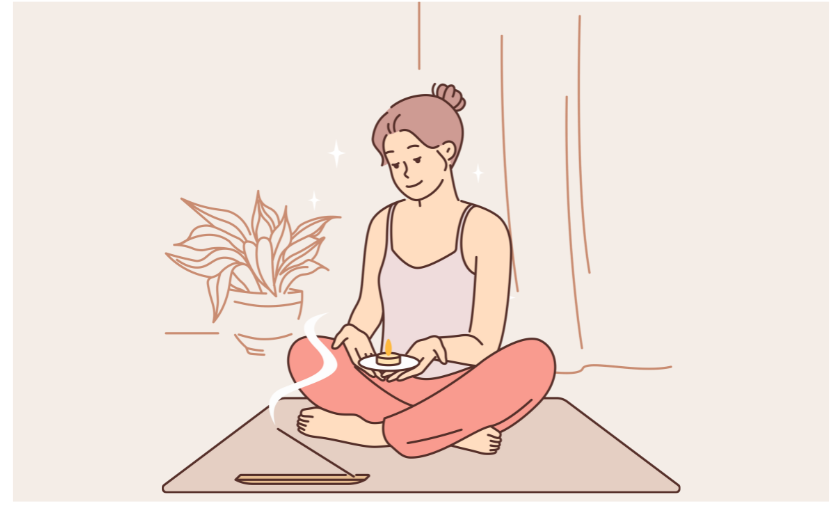» Physical and mental well-being
The Power of Self Observation: Tips and Strategies for Self-Insight
Introduction
Self-observation is the ability to isolate aspects of oneself from immersion in ongoing life, standing apart to see the sources of one’s behavior, thinking, and effects on others [1]. Through introspection and self-reflection, individuals can apprehend their thoughts and actions as they emerge, enabling consciousness and personal development [1].
Self-observation allows a person to change or correct their thinking, behavior, and impact in the world [1]. This article explores the power of self-observation through meditation, discussing strategies for fostering greater self-awareness and the profound benefits of this practice for awakening insights and growth [1].
Understanding the Observing Self
The observing self refers to our ability to observe our own thoughts, feelings, sensations, and the external world without judgment or evaluation [2]. It is different from the “thinking self,” which is responsible for mental chatter, worrying, and evaluating things [2].
The observing self, also known as the self-as-context, is a concept in Acceptance and Commitment Therapy (ACT) [3]. It allows one to “zoom out” and see a situation objectively, rather than getting caught up in the conceptualized self or ego [3].
Self-observation is the process of becoming more self-aware and observing oneself objectively, as if one were an outside observer [4] [5] [6]. It involves:

- Witnessing one’s thoughts, feelings, beliefs, habits, and behaviors [5] [6]
- Understanding how they impact one’s life [5]
- Paying attention to one’s thoughts, feelings, and behaviors without judgment and with a sense of curiosity [7] [6]
The idea of the ‘self’ observing itself can be understood as the process of introspection or self-reflection [7]. It involves:
- Turning one’s attention inward to gain insight into one’s own thoughts, emotions, and motivations [7]
- Avoiding reacting to thoughts and emotions, and simply witnessing them without judgment, which can lead to a deeper understanding of the self and even a ‘radical transformation’ of one’s thought system [7]
- Observing oneself without using words or past knowledge to avoid getting distracted by the meanings and associations we have attached to things over time [7]
Self-observation is the ability to step back and observe one’s own thoughts, behaviors, and effects on others [1]. It allows a person to change or correct their thinking and actions as they emerge [1]. Self-observation must be developed through ongoing practice, especially when engaged with a community dedicated to this practice, as it is essential for real change and development in organizations [1].
Practicing Self-Observation
Practicing self-observation involves cultivating present-moment awareness and stepping back to witness one’s thoughts and emotions without getting entangled in them [3]. Several techniques can be employed:
- Mindfulness Meditation and “Noting”: Practicing mindfulness meditation and the “noting” technique, where you mentally label or note your thoughts and sensations as they arise, can strengthen the observing self by training you to stay present and observe without judgment [2].
- Reflective Exercises: Methods like reflecting on who you’ve become, considering your ideal self vs. actual self, and keeping a journal to track your self-awareness journey can foster self-observation [4]. Seeking feedback from others and self-assessment questionnaires can also aid in this process [6].
- Meditation and Journaling: Meditation helps cultivate the “inner witness” to observe thoughts, emotions, and actions objectively [4], while journaling provides a space for self-reflection and documenting your journey [5].
- Observational Tools: Using video recording to observe yourself learning new skills or performing tasks can improve self-awareness and performance [4]. Other techniques include observing yourself in the mirror, expressing through art, poetry, or doodling, and pausing to reflect on your reactions [6].

When practicing self-observation, it’s crucial to focus on progress and self-improvement rather than criticism [4]. It’s an ongoing, dynamic process that can lead to greater self-understanding and personal growth [4].
Additionally, there are two levels of self-observation: Level 1 involves gaining psychological self-awareness, while Level 2 involves observing the nature of the self or ego to realize the absence of a separate self [5].
Benefits of Self-Observation
Connecting with the observing self has been shown to have numerous benefits, including:
- Reduced feelings of anxiety and depression [2]
- Improved self-esteem [2]
- Increased positive emotions [2]
- Reduced rumination [2]
- Improved attention and focus [2]
- Better interpersonal relationships [2]
- Reduced risk of cardiovascular disease [2]
Knowing one’s values is important, as it allows the ego or conceptualized self to “rest” rather than constantly driving one to fulfill stories or achieve status [3]. Self-observation methods can help gain insight into emotions, thought patterns, and behaviors, leading to personal growth and development [6].
Furthermore, self-observation provides several key benefits:
- Self-Knowledge and Clarity: It is a fundamental practice that can provide self-knowledge, clarity of mind, and the ability to make better life decisions, which are key factors in leading a healthy and successful life [8].
- Breaking Negative Cycles: Through practices like meditation, self-observation can help identify negative or habitual cycles and reprogram the brain to shift the quality of self-observation, allowing one to escape these cycles [10].
- Intentional Living: Combining self-observation with experimentation gives a greater sense of resiliency and agency in one’s life. Observing one’s thoughts, feelings, and actions allows identifying problems, while experimentation provides the power to make intentional changes [10]. This empowers one to make intentional choices based on self-awareness, leading to personal growth, balance, and continuous learning [10].
- Improved Decision-Making: Self-observation during stressful situations can reveal how stress influences decision-making and behavior, leading to undesirable outcomes. This awareness provides an opportunity to break free from negative patterns [10].
- Professional Growth: For teachers, self-observation can provide tangible observation data and meta-awareness about their teaching practice, disabusing them of the notion of certainty and providing insight for future improvement while challenging assumptions [9].
Conclusion
The power of self-observation lies in its ability to foster self-awareness, personal growth, and intentional living. Through practices like mindfulness meditation, reflective exercises, and journaling, individuals can cultivate the skill of observing their thoughts, emotions, and behaviors from a detached perspective.
This heightened self-awareness allows for breaking negative cycles, improving decision-making, and aligning one’s actions with their values and aspirations.
Ultimately, self-observation is a transformative tool that empowers individuals to gain clarity, make intentional choices, and live with greater authenticity and purpose. By embracing the practice of self-observation, one can embark on a journey of continuous self-discovery, growth, and personal fulfillment, leading to a more meaningful and fulfilling life.

References
[1] – https://carolsanford.medium.com/self-observation-and-resourcing-develop-the-capability-for-self-reflection-premise-4-a1d9ae8b205d
[2] – https://medium.com/curious/the-observing-self-a-key-concept-for-mental-health-and-happiness-1216e3d68911
[3] – https://www.rhythmandresolve.com/blog1/2019/8/7/acceptance-and-commitment-therapy-the-observing-self
[4] – https://www.wikihow.com/Practice-Self-Observation
[5] – https://lonerwolf.com/self-observation/
[6] – https://www.quora.com/What-are-some-methods-of-self-observation
[7] – https://www.quora.com/What-does-self-observation-mean-How-can-self-observe-itself
[8] – https://www.linkedin.com/pulse/self-observation-really-important-rashad-mirzayev
[9] – https://itdi.pro/blog/2016/10/18/the-benefits-of-observing-self/
[10] – https://www.linkedin.com/pulse/power-self-observation-experimentation-personal-growth-shawny-green-xxyec
[11] – https://f5webserv.wright.edu/~scott.williams/LeaderLetter/selfawareness.htm

